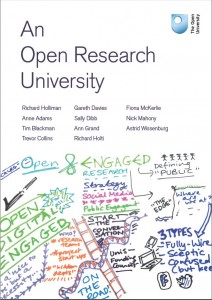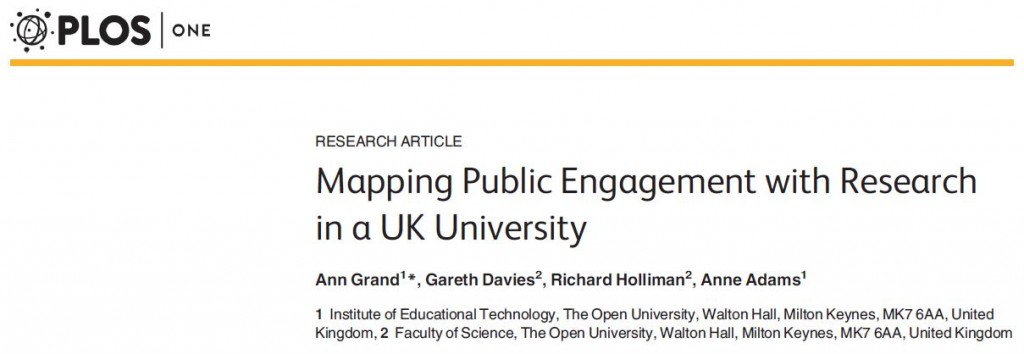I’ve long admired the work of my colleague Professor Martin Weller. Studies conducted in the Institute of Educational Technology (IET), in particular research exploring the practices of digital scholarship, were central to the development of the Open University’s proposal to RCUK to become one of eight Public Engagement with Research Catalyst universities. Since that earlier work Martin has further explored ideas about openness in higher education, culminating in his latest book, The battle for open: How Openness Won and Why it Doesn’t Feel Like Victory.
We’ve recently completed the work of the OU’s RCUK-funded Public Engagement with Research (PER) Catalyst, An Open Research University, publishing our final report (Holliman, et al. 2015). As such, members of the OU’s PER Catalyst project team and I have spent recent months consolidating the learning from our project with the aim of sharing lessons learned and resources with other universities, including the RCUK Catalyst Seed Funded universities.
Through this process of reflection I’ve been struck by some of the similarities between the issues Martin and his colleagues in IET have been exploring in relation to openness and the work we’ve been undertaking to embed the practices of engaged research within the OU’s research culture.
A battle joined
First and foremost, it’s clear to me that there is an ongoing battle to be won both for open and engaged research. Universities need to introduce measures to incentivise, support and recognise excellence in engaged research. But universities are not the only stakeholders that need to change. For a culture of engaged research to be sustainable in the medium to long-term also requires ongoing recognition and acceptance of its progressive value(s) by researchers, funders and ultimately, policy-makers.
A focus on practice
A second similarity with the work of Martin and his colleagues work lies in a focus on scholarly practices, exploring how they are changing and, crucially, what measures could be introduced to catalyse change with the aim of further embedding and extending the practices of engaged research.
In our project we adopted an action research approach, working collaboratively with researchers at all levels across the institution to identify and implement strategies that work for them and the stakeholders, user communities and members of the public that engage with their research. As such, we worked from the premise that rather than impose solutions, we would offer advice and a supportive framework where researchers and their publics could define engagement on their terms; in other words to offer consistency within diversity.
We employed a combination of surveys, interviews and interventions to identify a number of challenges and proposed solutions to address them. For example, we found that researchers have a relatively narrow view of engaged research and the communities with which they interact and very few researchers strategically evaluate their engaged research activities (Grand, et al. 2015).
Our final report documents some of the interventions we have introduced with the aim of broadening and deepening future researcher engagement, including a definition of engaged research and revised promotion criteria that include knowledge exchange profiles.
The politics of engaged research
Our project is part of a wider political agenda for research in the UK. As such, the mainstreaming of engaged research was always destined to become enmeshed with the agenda for research impact. This places demands on researchers, universities, funders and policy makers.
In the conclusion to our report I argue that engaged research will only be prioritised on a sustainable basis if researchers:
- Generate funds to cover the costs for them, their stakeholders, and associated expenses for activities.
- Produce quality outputs, ideally ones that can be submitted to future sector-wide assessments of research.
These requirements place responsibilities on universities, researchers and funders, but also on politicians.
- Researchers need to plan effectively, to focus on process (e.g. by exploring the dimensions of engaged research) and ensure that they consider the potential to generate both social and economic impacts.
- Universities need to incentivise researchers and provide support mechanisms for all grades of staff, developing measures for the routine collection of evidence from the impacts of engaged research. Some of this can be achieved through technology. It also requires investment in staff to collect evidence and analyse evidence.
- Funders should provide consistent messaging and ensure that assessors and panels make robust assessments of Pathways to Impact plans. The significance of the impacts from engaged research should not be downplayed by the ‘seductive siren of reach’ (Holliman and Davies, 2015); they should be considered in relation to each other. Furthermore, funders should reinforce the mantra that “all pathways to research impact are created equal”, allowing assessors to judge the quality of the plans on their merits.
Progress has been made on all three counts through the Public Engagement with Research Catalyst initiative, but further work is required for these approaches to become fully embedded within cultures of research. This requires political leadership to give funders the confidence to support excellent, progressive and sustainable approaches that meaningfully engage stakeholders with research to generate emergent benefits, effects and changes.
References
Grand, A., Davies, G., Holliman, R. and Adams, A. (2015). Mapping public engagement with research in a UK university. PLOS ONE, 10(4) pp. 1–19.
Available from: http://oro.open.ac.uk/43126
Holliman, R., Adams, A., Blackman, T., Collins, T., Davies, G., Dibb, S., Grand, A. Holti, R., McKerlie, F., Mahony, N. and Wissenburg, A. (2015). An open research university: final report. Milton Keynes, The Open University.
Available from: http://oro.open.ac.uk/44255
Holliman, R. and Davies, G. (2015, in press). ‘Moving beyond the seductive siren of reach: planning for the social and economic impacts emerging from school-university engagement with research’, Jcom
Acknowledgements
This project was made possible through the Open University’s RCUK-funded Public Engagement with Research Catalyst, ‘An open research university‘.
Eleven authors were involved in co-producing the final report: myself, Anne Adams, Tim Blackman, Trevor Collins, Gareth Davies, Sally Dibb, Ann Grand, Richard Holti, Nick Mahony, Fiona McKerlie and Astrid Wissenburg. In addition, Eileen Scanlon and Hide Stephansen were core members of the project team. The different voices of these authors represent some of the diversity in how engaged research is being conceptualised in different academic domains at the Open University.
We are grateful to a large number of Open University staff for their contributions to our Public Engagement with Research Catalyst, also to our Advisory Board, and to colleagues from the other seven Public Engagement with Research Catalyst universities. We have acknowledged as many of these contributors as our failing memories could recall on the inside covers of the final report (Holliman, et al. 2015).



